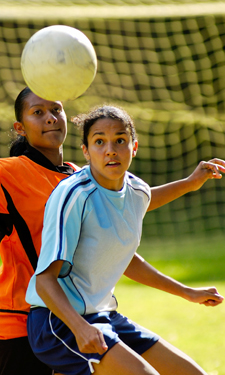 As unassuming as a neighborhood park might be, it can make all the difference in a young girl’s life. Serena and Venus Williams honed their tennis talents on the courts of a local park in Compton, California. Playing at the Martin Luther King Recreation Center in South Bend, Indiana, Notre Dame star guard and WNBA basketball prospect Skylar Diggins perfected her shots and steals.
As unassuming as a neighborhood park might be, it can make all the difference in a young girl’s life. Serena and Venus Williams honed their tennis talents on the courts of a local park in Compton, California. Playing at the Martin Luther King Recreation Center in South Bend, Indiana, Notre Dame star guard and WNBA basketball prospect Skylar Diggins perfected her shots and steals.
But park and recreation programs do more than nurture budding Olympians and professional athletes. Athletics benefit all those who participate while strengthening our communities. Female athletes in particular earn better grades, are more likely to graduate from high school and attend college, and have higher wages in the workplace. Clearly, girls and women value athletics and will participate when given the chance. High school female sports participation jumped from below 300,000 in 1972 to more than 3 million today, after the passage of the landmark sports equality law Title IX.
We now find ourselves at a similar turning point for girls’ participation in park and recreation sports programs. While involvement is growing, a huge gap remains between boys’ and girls’ engagement in these activities. The need for transformation could not be clearer:
• A study of 50,000 Boston youths showed that girls participate at half the rate of boys in community-based sports and physical activity programs.
• A study compiling data from six states, from Maryland to Minnesota, found that parks with basketball courts, running tracks, and other sports-related amenities are associated with higher physical activity levels among adolescent girls.
• A survey of 100 inner-city and suburban parks in Southern California revealed that girls are generally less satisfied than boys with available park equipment and programs, suggesting a need to shift and broaden activities to better incorporate girls.
To address disparities in community youth athletics, California passed AB 2404 in 2004 and Washington state implemented Fair Play in Community Sports in 2009. These legislative steps extend Title IX-like standards to park and recreation programming, where many children first discover their love of sports. California’s law requires equity in youth leagues hosted by cities and counties, while Washington takes a step further, calling for equitable sports opportunities in all athletics, including adult sports. Both laws provide a right of action, allowing individuals to bring a lawsuit over inequities. Programs run by third parties that use park and recreation space are also considered in assessing whether the department is compliant with the state laws.
In addition to California and Washington’s groundbreaking policies, various state constitutions and equal rights amendments provide bases to guarantee equal sports opportunities in community athletics nationwide. Certain cities have been proactive in implementing gender-equity policies. For example, Los Angeles’ “Raise the Bar” initiative focuses on increasing opportunities for girls (previously afforded only 20 percent of athletic opportunities in the city). Boston conducted a self-assessment that revealed only 33 percent of local athletic participation opportunities were filled by girls, despite the fact that females account for 49 percent of Boston’s youth population. As a result, municipal officials and nonprofit partners have begun to address and close the gaps.
Park and recreation sports programs represent the new frontier for ensuring equality in athletics. The National Recreation and Park Association’s Board of Trustees recognized this through its “Gender Equity in Recreation and Sports” 2002 policy statement, calling for gender-equitable standards in parks and recreation athletic programming. Just as girls’ involvement in sports soared after the passage of Title IX, laws and policies mandating equal access to neighborhood athletic opportunities are necessary to ensure that everyone can reap the lifelong benefits of sports participation.
Kim Turner is the John and Terry Levin Fellow at the Fair Play for Girls in Sports—Gender/LGBT Program of the Legal Aid Society-Employment Law Center in San Francisco.
The Next Title IX
April 1, 2013, Department, by Kim Turner

